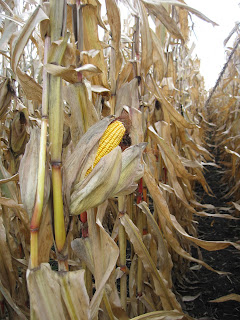
Yesterday seemed to be the first real day of fall. The sun was shining, farmers were out in the fields, and the air was crisp instead of down-right cold. For the past few weeks, fall has felt like winter with 30 and 40 degree temperatures. It had seemed that we skipped autumn. Finally, we’ve had a weekend where farmers could get to harvesting their crops.
When I left volleyball practice in the morning, I had a smile on my face knowing that the guys were going to be able to get some much needed work done. Along with the lack of sun, we’ve had some rainy days that have frustrated farmers (and farmers’ wives). On my drive home, I admired the color of the corn and bean fields swaying under the sunshine. The ready-to-harvest crop always looks better on sunny days. I called Grant with excitement in my voice. “It’s a great day to get some harvesting done!” I exclaimed.
“Yeah, well, it’d be great if we weren’t broke down,” he replied with disappointment.
The thing is, it can be the nicest day of the year for farmers to plant or harvest crops, but if one of their pieces of equipment breaks down, it can hold them up for minutes, hours, or days. This is something I’ve learned the past two years while being a farmer’s wife. They will work for hours at a time trying to find the problem in a huge piece of equipment only to find that sometimes they can’t fix it themselves. Sometimes reinforcements from the Case IH dealer in Galesburg are called to help with the break down.

Since the field was on my drive home, I told Grant I’d stop by since they were just waiting until the problem was fixed. As I neared the crossroads where they were stopped, I knew it wasn’t a good situation. Two semi-trucks, two grain cart tractors, the big tool truck, a Case IH pickup, and the broken down combine were all sitting on the side of the field. A few men were standing in the field while they watched on as three others were on top of the corn head working to solve the issue (the corn head is the piece that is on the front of the tractor that picks the corn).

I parked my Tahoe off to the side and got out to be greeted by a cold wind. The sunshine was deceiving while I had been in the car. Although it looked like fall, it was still quite chilly. Shivering in my sweatshirt and jeans, I walked carefully through freshly cut corn stalks over to Grant. He had a few corn cobs (without pieces of corn on them) in his hands, but I had no idea what they were for. (These cobs are the ones that the combine shoots out the back once it shucks all the corn kernels off. They can be found all over in freshly picked fields of corn.) Not paying much attention to the corn cobs he was fiddling with, we chatted for a few minutes and then walked over to where a few of the guys were standing next to the corn that had yet to be picked. Grant’s grandfather, Grandpa Strom, and the hired man’s son, Brandon, also had the cobs in their hands. Again, not paying much attention, I continued to talk with them about the break down and about my morning at practice.


All of a sudden, in a stealth attack Brandon started throwing the cobs at Grant and Grandpa Strom. Grant dodged the cobs and started to whip others at Brandon who was then hiding in the rows of corns. Grandpa Strom turned quickly around to whip an entire ear of corn at Brandon, missed him, and almost fell over. I jumped out of the way, not knowing what the heck was going on. Doug, Grant’s dad, saw the fight and laughed as he yelled, “You better watch out, Kristen! They’ve been corn cobbin’ each other while we’ve been waiting.” If corn cobbin’ was in the dictionary, it was be defined as
the act of throwing corn cobs at another to pass the time spent in a field while waiting for a break down to be fixed. Since I was more concerned with getting warm, I got in my car and left the guys to their corn cobbin’ and combine fixin’.







